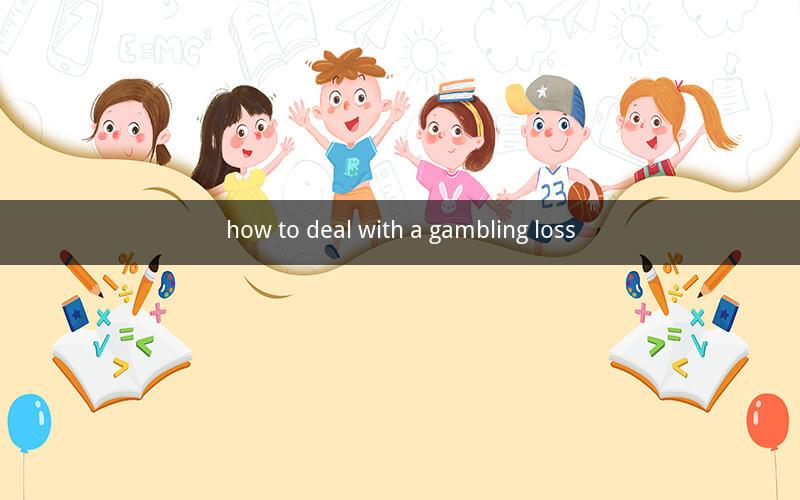
Table of Contents
1. Understanding the Problem
2. The Emotional Impact of Gambling Loss
3. Identifying the Causes of Gambling Loss
4. Strategies for Coping with Gambling Loss
- Acknowledge the Loss
- Seek Support
- Analyze the Reasons
- Develop a Budget
- Practice Self-Care
5. Professional Help and Resources
6. Preventing Future Gambling Losses
7. Conclusion
1. Understanding the Problem
Gambling loss is a common issue that affects individuals from all walks of life. It can lead to financial, emotional, and social consequences, making it crucial to understand the problem and seek effective solutions. The first step in dealing with a gambling loss is to acknowledge its impact on your life.
2. The Emotional Impact of Gambling Loss
The emotional toll of gambling loss can be profound. Feelings of guilt, shame, and despair often accompany the realization of financial loss. It's important to recognize these emotions and address them appropriately to facilitate healing and recovery.
3. Identifying the Causes of Gambling Loss
To effectively deal with gambling loss, it's essential to identify its underlying causes. Common causes include:
- Addiction: Problem gambling can develop into an addiction, leading to compulsive behavior and financial loss.
- Mental Health Issues: Conditions such as depression, anxiety, and stress can contribute to problem gambling.
- Social and Environmental Factors: Peer pressure, access to gambling facilities, and advertising can influence gambling behavior.
4. Strategies for Coping with Gambling Loss
Dealing with gambling loss requires a multifaceted approach. Here are some effective strategies:
- Acknowledge the Loss
The first step is to accept the reality of the loss. Denial can hinder recovery and prevent you from seeking help.
- Seek Support
Don't hesitate to reach out to friends, family, or support groups for assistance. Sharing your experiences can provide relief and guidance.
- Analyze the Reasons
Understanding the reasons behind your gambling loss can help you develop strategies to prevent future occurrences. Reflect on your behavior and identify potential triggers.
- Develop a Budget
Creating a budget can help you manage your finances and avoid overspending. Allocate funds for essential expenses and save the remainder for emergencies.
- Practice Self-Care
Taking care of your physical and mental health is crucial during this challenging time. Engage in activities that promote well-being, such as exercise, meditation, and hobbies.
5. Professional Help and Resources
If you're struggling to cope with gambling loss, seeking professional help is essential. Therapists, counselors, and support groups can provide personalized guidance and support.
6. Preventing Future Gambling Losses
To prevent future gambling losses, consider the following tips:
- Set Limits: Establish a budget and stick to it.
- Avoid High-Risk Situations: Stay away from gambling environments that trigger your problem.
- Stay Informed: Educate yourself about the risks of gambling and its potential consequences.
- Develop Coping Skills: Learn healthy ways to manage stress and anxiety.
7. Conclusion
Dealing with a gambling loss is a challenging process, but it's essential to address the issue head-on. By understanding the problem, seeking support, and implementing effective strategies, you can overcome this obstacle and move forward.
Questions and Answers
1. What are the signs of problem gambling?
- Signs of problem gambling include chasing losses, borrowing money to gamble, lying about gambling activities, and neglecting responsibilities.
2. How can I overcome the guilt associated with gambling loss?
- Acknowledge your feelings and seek support from friends, family, or professionals. Practice self-compassion and focus on your recovery journey.
3. Are there any free resources available to help with gambling loss?
- Yes, many organizations offer free resources, such as hotlines, support groups, and educational materials.
4. How can I prevent relapse after overcoming gambling loss?
- To prevent relapse, establish a strong support network, develop healthy coping skills, and stay vigilant about potential triggers.
5. Can therapy help with gambling loss?
- Yes, therapy can be an effective tool for dealing with gambling loss. Therapists can provide personalized guidance and support to help you overcome the issue.
6. How long does it take to recover from gambling loss?
- Recovery time varies for each individual. Some may experience immediate relief, while others may require ongoing support and therapy.
7. Can I gamble responsibly if I have a gambling problem?
- No, it's not possible to gamble responsibly if you have a gambling problem. It's important to seek help and avoid gambling altogether.
8. What should I do if I think a loved one has a gambling problem?
- Encourage your loved one to seek help and offer support. You can also reach out to professionals or support groups for guidance.
9. How can I protect my children from gambling?
- Educate your children about the risks of gambling and monitor their activities. Establish clear boundaries and discuss the importance of responsible behavior.
10. Can I recover from gambling loss on my own?
- While it's possible to recover from gambling loss on your own, seeking professional help and support from others can significantly improve your chances of success.